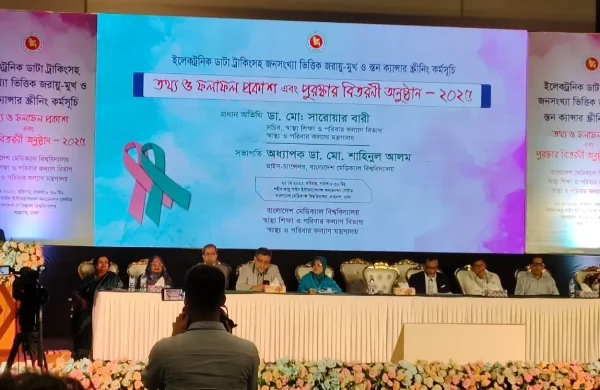Cervical-and-Breast cancer-causing virus found in an average of 4.27pc of women
- Update Time : Sunday, May 25, 2025

Staff Correspondent:
Human Papillomavirus (HPV) – a major cause of cervical cancer – has been foundin an average of 4.27% of women in Bangladesh in a study over the past five years.
This was revealed at at a national event held at the Shaheed Abu Sayeed Convention Center of BMU on Sunday when key findings from a nationwide cervical and breast cancer screening programme incorporating electronic data tracking were unveiled . The event also included an awards ceremony and dissemination of screening outcomes.
Professor Dr. Ashrafunnesa, director of the population-based cervical and breast cancer screening project, presented the research findings.
She reported that Human Papillomavirus (HPV)—a major cause of cervical cancer—was detected in an average of 4.27% of women screened over the last five years. This suggests that around 5 out of every 100 women carry this sexually transmitted virus. If this trend continues, it could become a serious public health concern for Bangladeshi women.
Ashrafunnesa emphasised, “We are engaged in an ongoing battle against cancer, and we must continue this fight. The government has already introduced the HPV vaccine, as this virus often remains dormant and symptomless for 10–15 years before potentially developing into cancer. Nationwide, women are undergoing colposcopy screenings, which enable both early diagnosis and immediate treatment.”
She also noted that screening initiatives have already started at the district level and called for an expansion of such efforts to detect and treat cases early.
Dr. Asma Akter Sonia led a pilot study in two upazilas to evaluate the role of high-risk HPV genotyping in cervical cancer screening. The study involved 10,000 women aged 30 to 60 from each area. Results showed a 3.2% prevalence of high-risk HPV (HR-HPV), with 318 women infected. Among them, 1% (97 women) had HPV type 16 and 0.2% (20 women) had type 18. The study concluded that HR-HPV testing is more sensitive than VIA (Visual Inspection with Acetic Acid).
Dr. Md. Sarwar Bari, secretary of the Health Education and Family Welfare Division at the Ministry of Health and Family Welfare, stressed the need to integrate screening into the regular health system. “Our health complexes, hospitals, and family planning officials are monitoring this effort. Reaching women aged 30–60 remains a challenge, but with collective support, we can expand screening and research.”
He added that the BMU is actively working in health education and research. “We plan to establish additional specialized institutions beyond Dhaka for women’s health. An independent institute under BMU has also been proposed. Women’s health continues to be neglected, but with effort from the grassroots to policymakers, we can ensure progress.”
Bari also highlighted that cervical and breast cancer are among the leading causes of death in Bangladeshi women. “The core goal of healthcare is diagnosis and treatment. Today’s focus is on screening, which is key to reducing prevalence.”
The event was presided over by BMU Vice-Chancellor Professor Dr. Shahinul Alam, with Dr. Md. Sarwar Bari attending as the chief guest.














